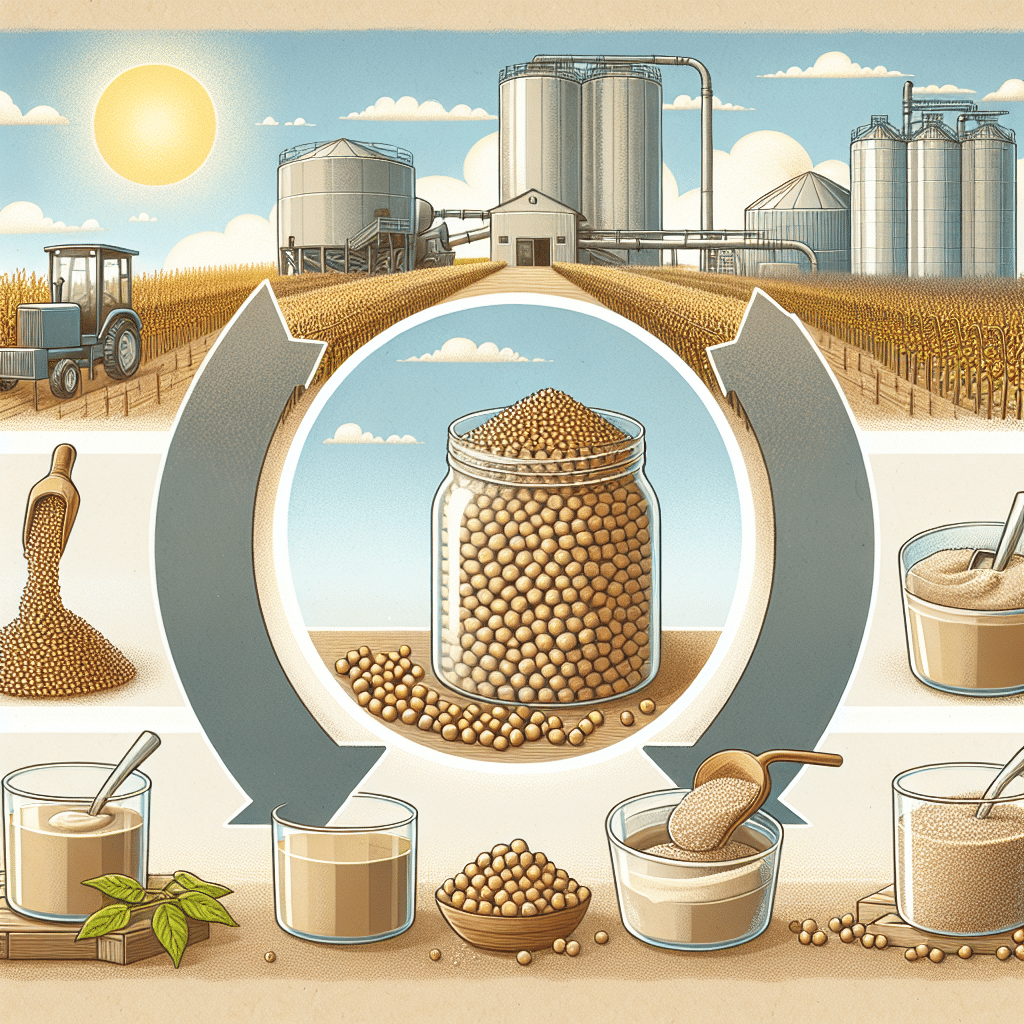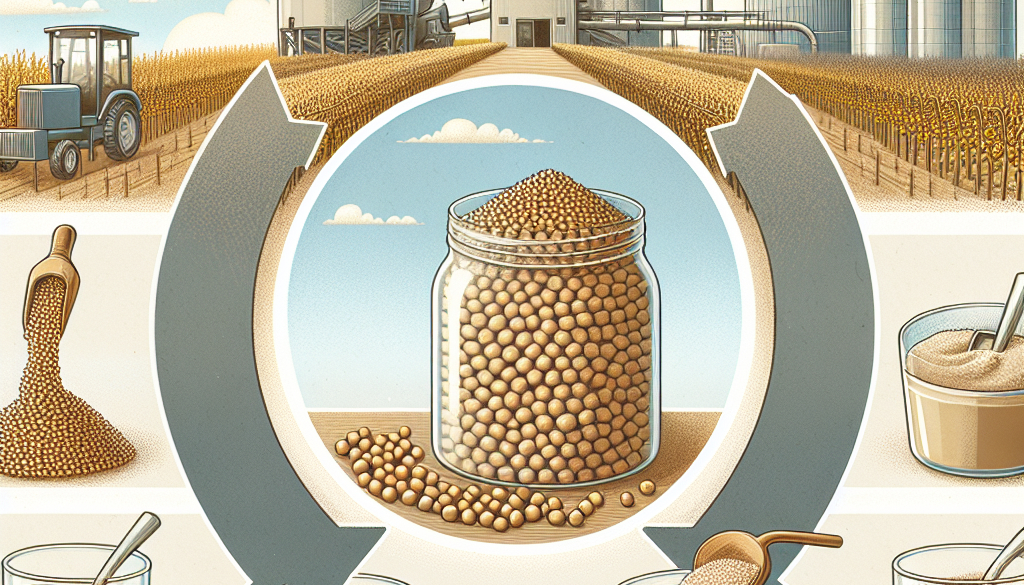Is Textured Soy Processed?
Table of Contents
- Understanding the Processing of Textured Soy Protein
- What is Textured Soy Protein?
- The Production Process of Textured Soy Protein
- Nutritional Profile of Textured Soy Protein
- Is Textured Soy Protein Considered Processed?
- Health Considerations and Dietary Implications
- Environmental and Ethical Considerations
- Conclusion: Balancing Nutrition and Processing in Textured Soy Protein
- Discover ETprotein’s High-Quality Protein Products
Understanding the Processing of Textured Soy Protein

Textured soy protein (TSP), also known as textured vegetable protein (TVP), is a versatile food ingredient derived from soybeans. It’s widely used as a meat substitute or meat extender, and its popularity has grown with the rise of vegetarian and vegan diets. However, there’s a common question that arises among health-conscious consumers: Is textured soy processed? This article delves into the production and processing of textured soy protein, its nutritional profile, and its place in a balanced diet.
What is Textured Soy Protein?
Textured soy protein is made from soy flour that has had the soy oil extracted. It’s then cooked under pressure, extruded, and dried to produce a product that has a texture similar to that of meat. This process allows TSP to be rehydrated easily and used in a variety of dishes, from tacos and chili to stews and burgers.
The Production Process of Textured Soy Protein
The process of making textured soy protein involves several steps, each crucial to achieving the final product’s texture and nutritional value.
- Defatting: Soybeans are first cleaned and then crushed to extract the oil, leaving behind a defatted soy flour.
- Extrusion: The defatted soy flour is then mixed with water and fed into an extruder. Under high heat and pressure, the soy flour is cooked and forced through a die that shapes it into granules, flakes, or chunks.
- Drying: After extrusion, the product is dried to reduce moisture content, making it shelf-stable.
- Flavoring: In some cases, TSP is further processed by adding flavorings or colorings to enhance its taste and appearance, mimicking various types of meat.
While the process may seem complex, it’s designed to create a product that’s high in protein, low in fat, and versatile in the kitchen.
Nutritional Profile of Textured Soy Protein
Textured soy protein is celebrated for its high protein content, which is comparable to that of meat. It’s also a good source of dietary fiber, vitamins, and minerals, such as potassium, iron, and calcium. Additionally, TSP is low in fat and contains no cholesterol, making it a heart-healthy alternative to animal protein.
Is Textured Soy Protein Considered Processed?
By definition, textured soy protein is a processed food. It undergoes mechanical and chemical alterations to transform from a soybean into a meat-like product. However, the term “processed” encompasses a wide range of food products, from minimally processed items like frozen vegetables to heavily processed foods like candy bars.
The degree of processing in TSP can vary depending on the brand and the intended use. Some TSP products are minimally processed, containing only soy flour and perhaps a few natural flavorings. Others may include additional ingredients like colorings, preservatives, or other additives.
Health Considerations and Dietary Implications
When considering the health implications of textured soy protein, it’s essential to look at the broader context of an individual’s diet. TSP can be part of a healthy diet when consumed in moderation and as part of a balanced meal plan that includes a variety of whole foods.
However, some concerns have been raised about processed soy products, including TSP. These include:
- The presence of additives and preservatives in some TSP products.
- The potential for soy allergies, which can be triggered by soy proteins.
- Concerns about genetically modified organisms (GMOs), as many soybeans are genetically modified.
It’s important for consumers to read labels carefully and choose TSP products that align with their dietary preferences and restrictions.
Environmental and Ethical Considerations
Textured soy protein is often touted as a more sustainable and ethical alternative to meat. Soybeans require less land, water, and energy to produce than livestock, and they emit fewer greenhouse gases. Additionally, TSP does not involve the ethical concerns associated with animal farming.
However, the environmental impact of soy production can vary greatly depending on farming practices. Issues such as deforestation and the use of pesticides and fertilizers must be considered when evaluating the sustainability of soy products.
Conclusion: Balancing Nutrition and Processing in Textured Soy Protein
In conclusion, textured soy protein is indeed a processed food, but its level of processing can vary. As with any food product, it’s important to consider the nutritional benefits alongside any potential drawbacks. TSP can be a nutritious part of a balanced diet, especially when chosen carefully and consumed in moderation.
The key takeaways for consumers are to look for minimally processed TSP options, be mindful of any added ingredients, and consider the broader environmental and ethical implications of their food choices.
Discover ETprotein’s High-Quality Protein Products
If you’re interested in incorporating high-quality protein into your diet, ETprotein offers a range of organic bulk vegan proteins that are non-GMO and allergen-free. Their products, including textured soy protein, are characterized by a neutral taste and high purity levels, making them an excellent choice for those seeking sustainable and healthy protein sources.
About ETprotein:
ETprotein, a reputable protein and L-(+)-Ergothioneine (EGT) Chinese factory manufacturer and supplier, is renowned for producing, stocking, exporting, and delivering the highest quality organic bulk vegan proteins and L-(+)-Ergothioneine. They include Organic rice protein, clear rice protein, pea protein, clear pea protein, watermelon seed protein, pumpkin seed protein, sunflower seed protein, mung bean protein, peanut protein, and L-(+)-Ergothioneine EGT Pharmaceutical grade, L-(+)-Ergothioneine EGT food grade, L-(+)-Ergothioneine EGT cosmetic grade, L-(+)-Ergothioneine EGT reference grade and L-(+)-Ergothioneine EGT standard. Their offerings, characterized by a neutral taste, non-GMO, allergen-free attributes, with L-(+)-Ergothioneine purity over 98%, 99%, cater to a diverse range of industries. They serve nutraceutical, pharmaceutical, cosmeceutical, veterinary, as well as food and beverage finished product distributors, traders, and manufacturers across Europe, USA, Canada, Australia, Thailand, Japan, Korea, Brazil, and Chile, among others.
ETprotein specialization includes exporting and delivering tailor-made protein powder and finished nutritional supplements. Their extensive product range covers sectors like Food and Beverage, Sports Nutrition, Weight Management, Dietary Supplements, Health and Wellness Products, and Infant Formula, ensuring comprehensive solutions to meet all your protein needs.
As a trusted company by leading global food and beverage brands and Fortune 500 companies, ETprotein reinforces China’s reputation in the global arena. For more information or to sample their products, please contact them and email sales(at)ETprotein.com today.












